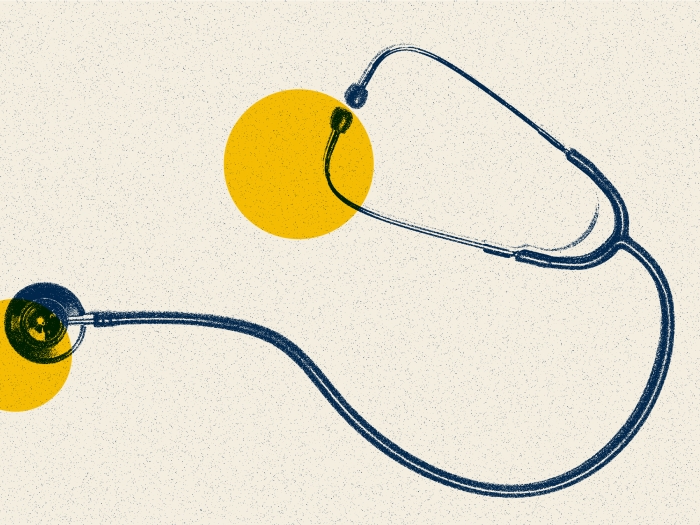Drop-off donation site open at the North Campus Research Complex, at corner of Huron Parkway and Plymouth Road in Ann Arbor
Authors |
Originally posted March 20. *updated April 24 with addition of 3-D printed face mask adjusters; updated April 6 with addition of scrubs to accepted items; updated April 1 with 3-D printed face shield link*
Right now, health care workers at the University of Michigan’s hospitals and clinics have the gear they need to protect themselves and others as they care for patients with COVID-19.
But with the number of COVID-19 patients rising daily, leaders at Michigan Medicine are asking for the community’s help in donating supplies now. That way, supplies will be ready if needed in coming days and weeks, to protect staff and patients at U-M’s academic medical center and outpatient clinics in several counties.
The drive, which began March 21, has already collected thousands of pieces of personal protective equipment (PPE) from individuals, organizations and companies. The donation site will be open Monday through Saturday from 12 p.m. to 5 p.m. at loading dock 90 of U-M's North Campus Research Complex, near the corner of Huron Parkway and Plymouth Road in Ann Arbor. The site is the former Pfizer complex that U-M purchased ten years ago.
UPDATE: As of Tuesday, March 31, the donation drive will accept food and toiletries that will be collected by Food Gatherers and distributed to organizations that help people in need. Find out what items are accepted here.
Note: Leaving home to donate protective gear to hospitals and other health organizations is permitted under the Michigan executive order that suspends non-essential operations. Trips to make such donations are exempted under the provision that allows volunteering for organizations that are serving individuals who need assistance as a result of the emergency.
What to donate:
New or unused:
- Disposable face masks
- 3-D printed face mask adjusters that relieve the pressure on the ears of healthcare workers. See https://specs.engin.umich.edu/u-m-face-mask-adjusters/ for information and specifications on our preferred design and materials
- N95 masks, sometimes called respirators
- Eye protection including face shields and safety goggles
- 3-D printed face shields. Please see https://specs.engin.umich.edu/um-face-shield/ for information and specifications on our preferred design and materials
- Fabric scrubs, in good condition, preferably washed before being dropped off
- Disposable gowns
- Disposable gloves, especially non-latex
- Disposable surgical caps
- Disposable foot covers
- Wipes: bleach or antimicrobial
- Hand sanitizer
- NEW starting March 31: Non-perishable, unopened food and toiletry items for Food Gatherers to distribute to local community service organizations. See the list of most-needed items here.
More specialized items:
- PAPRs (powered air-purifying respirators) and PAPR hoods
- Nasal testing swabs - Swabs should have a flexible shaft made out of nylon, which is scored so the top can be snapped off, with swab material of dacron or rayon. Mini-tipped swabs are preferred; standard tip swabs are acceptable.
- Viral transport medium (VTM) or universal transport medium (UTM)
Monetary donations and in-kind gifts to support Michigan Medicine COVID-19 operations can be made at https://giving.medicine.umich.edu/covid-19.
What not to donate:
- At this time U-M is not accepting 3-D printed ventilator parts, though the institution truly appreciates the offers it has received.
- Donations of other items such as medications, food, blankets, medical equipment or other supplies are not needed at this time. If that changes, an announcement will be made.
- The acceptance of homemade masks is under consideration, but at this time, Michigan Medicine encourages those making masks at home to donate to organizations that are actively accepting them.
When to donate:
Monday through Friday, 12 p.m. to 5 p.m.
Saturday, 12 p.m. to 5 p.m.
How to donate:
- The donation center is at Dock 90 of 2800 Plymouth Road, Ann Arbor, 48109 which is set back from Plymouth Road and Huron Parkway.
- Donors should enter from Huron Parkway and follow signs to the loading dock.
- Donors should go to Dock 90, which faces out onto Huron Parkway.
- Donors will not need to get out of their cars if they prefer not to.
- Staff will maintain safe physical distance from donors, and will wear gloves and regularly clean their hands.
- Donors will be asked to provide basic contact information and may request a receipt for their records
- The loading dock can accommodate donations of all sizes.
Large donations of existing or new supplies: Please do not ship large amounts of supplies before verifying that items you are donating meet our needs. Email: [email protected] first. If your offer is accepted, ship supplies to Michigan Medicine Donation Drive, 2800 Plymouth Rd Building 18, Dock 90, Ann Arbor, MI 48109
Donors who are not feeling well should wait until they feel better to donate.
“It’s truly incredible what we have heard from local residents and businesses, and people all over the state, in recent days. We’ve received offers of supplies that they know are needed to care for COVID-19 patients, and our team has ramped up quickly to be able to accept them,” says Janet Abbruzzese, who directs supply chain management for Michigan Medicine. “We have already had an amazing outpouring of supplies from scientific laboratories across the university, and now we are turning to the broader community.”
Volunteers are not needed at this time to sort donated items. If that changes it will be announced.
Questions? Email [email protected]
For more information on coronavirus and COVID-19 response at Michigan Medicine visit https://www.uofmhealth.org/covid-19-update
3D Printed Faceshield Donation information
Thank you for your interest in printing and donating faceshields to protect our patients and staff!
Please see https://specs.engin.umich.edu/um-face-shield/ for information and specifications on our preferred design and materials

Department of Communication at Michigan Medicine
Want top health & research news weekly? Sign up for Health Lab’s newsletters today!





